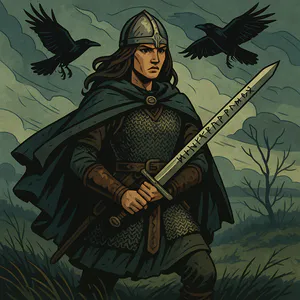Generate Anglo-Saxon names
More Real Name Generators- <% result.name %>
Discover all Story Shack apps
Discover the Essence of Your Anglo-Saxon Character
Creating a memorable character starts with a name that resonates with their heritage. Use these thought-provoking questions to inspire a name that embodies the spirit of the Anglo-Saxon era.
- What virtues or characteristics define the core of your character's personality?
- Which historical or mythical figures hold significance for your character's identity?
- What challenges has your character faced that influenced their name's meaning?
- How does your character's background shape their relationships and interactions?
- What aspirations or legacies do they hope to create through their actions?
Frequently Asked Questions
Explore common inquiries about the Anglo-Saxon Name Generator and learn how it can enrich your storytelling experience.
How does the Anglo-Saxon Name Generator work?
It utilizes a mix of traditional Anglo-Saxon naming conventions and meanings to produce unique names with every click.
Can I choose specific themes for the names I generate?
Currently, the generator does not accept custom input; however, you can keep clicking to find a name that fits your character's narrative.
Are the generated names unique?
Names are generated randomly, offering a diverse array of options; with unlimited clicks, you'll discover many unique names, although some may have similarities.
How many names can I generate?
You can generate as many names as you desire; simply click the generate button to explore a wealth of possibilities.
How do I save my favorite names?
You can easily copy a name by clicking on it, or bookmark it using the heart icon for future reference.
What are good Anglo-Saxon names?
There's thousands of random Anglo-Saxon names in this generator. Here are some samples to start:
- Thurstan
- Godwin
- Cynesige
- Cuthwine
- Eanlac
- Beyhild
- Hildegard
- Baldehuia
- Botill
- Herewynn
About the creator
All idea generators and writing tools on The Story Shack are carefully crafted by storyteller and developer Martin Hooijmans. During the day I work on tech solutions. In my free hours I love diving into stories, be it reading, writing, gaming, roleplaying, you name it, I probably enjoy it. The Story Shack is my way of giving back to the global storytelling community. It's a huge creative outlet where I love bringing my ideas to life. Thanks for coming by, and if you enjoyed this tool, make sure you check out a few more!


























































